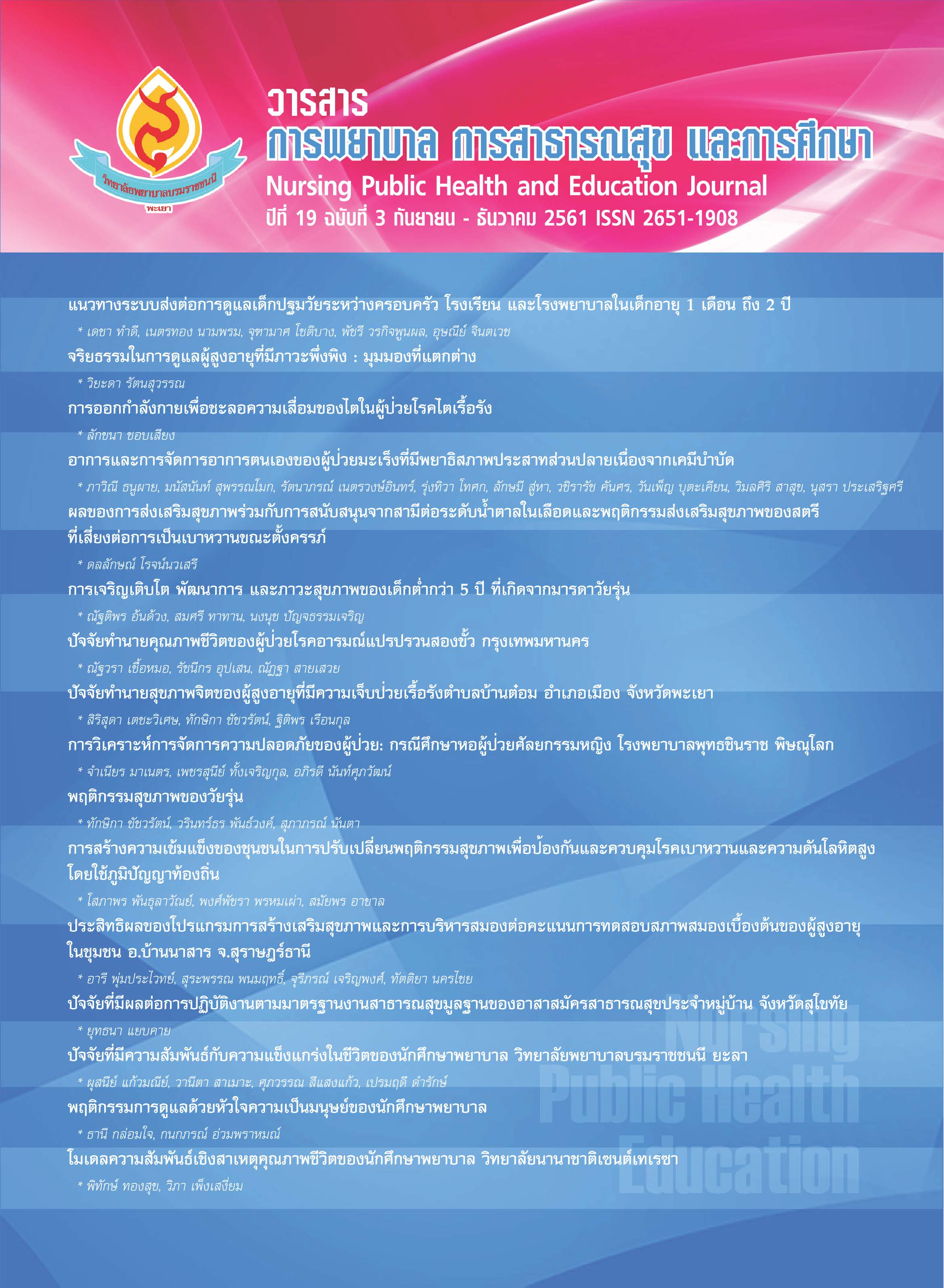ปัจจัยทำนายสุขภาพจิตของผู้สูงอายุที่มีความเจ็บป่วยเรื้อรังตำบลบ้านต๋อม
คำสำคัญ:
สุขภาพจิต, เจ็บป่วยเรื้อรัง, ผู้สูงอายุ, mental health, chronic illness, the eldersบทคัดย่อ
การวิจัยนี้มีวัตถุประสงค์เพื่อศึกษาระดับสุขภาพจิตของผู้สูงอายุที่มีความเจ็บป่วยเรื้อรัง และเพื่อศึกษาปัจจัยทำนายสุขภาพจิตของผู้สูงอายุที่มีความเจ็บป่วยเรื้อรังตำบลบ้านต๋อมอำเภอเมือง จังหวัดพะเยา โดยผู้สูงอายุที่มีความเจ็บป่วยเรื้อรังติดบ้านติดเตียง ภายใต้การดูแลของโรงพยาบาลส่งเสริมสุขภาพตำบลบ้านต๋อม มีการรับรู้ปกติสื่อสารภาษาไทยหรือภาษาถิ่นได้เข้าใจ และยินดีให้ความร่วมมือในการวิจัยจำนวน 66 คน แบบสอบถามที่ผู้วิจัยเป็นผู้อ่านให้ผู้สูงอายุฟัง ประกอบด้วย 6 ส่วน ได้แก่ ข้อมูลทั่วไป ด้านการรับรู้ภาวะสุขภาพ ด้านครอบครัว ด้านสังคม ด้านบริการสุขภาพและสุขภาพจิต การตรวจสอบความเที่ยงตรงของเนื้อหา โดยผู้ทรงคุณวุฒิ จำนวน 3 ท่าน และวิเคราะห์หาค่าความเชื่อมั่นของเครื่องมือ ได้ค่าความเชื่อมั่นเท่ากับ .73, 0.84, 0.75, 0.90 และ 0.74 ตามลำดับ วิเคราะห์ข้อมูลโดยใช้ สถิติความถี่ ร้อยละ ค่าเฉลี่ย และส่วนเบี่ยงเบนมาตรฐาน และวิเคราะห์ปัจจัยทำนายโดยใช้สถิติการวิเคราะห์การถดถอยพหุคูณ ผลการศึกษาพบว่า ผลการวิเคราะห์การรับรู้ภาวะสุขภาพ ด้านครอบครัว และ ด้านสังคมของผู้สูงอายุติดบ้านติดเตียง มีค่าเฉลี่ยอยู่ในระดับน้อย ส่วนด้านสถานบริการสุขภาพอยู่ในระดับมาก สำหรับผลการศึกษาระดับสุขภาพจิตของผู้สูงอายุติดบ้านติดเตียงพบว่า ผู้สูงอายุมีสุขภาพจิตต่ำกว่าคนทั่วไป มากที่สุด ร้อยละ 67.6 และเมื่อศึกษาปัจจัยทำนายภาวะสุขภาพจิต พบว่า การรับรู้ภาวะสุขภาพ ด้านครอบครัว ด้านสังคม และด้านสถานบริการสุขภาพ สามารถทำนายภาวะสุขภาพจิตในผู้สูงอายุได้ร้อยละ 31.3 ผลการศึกษาแสดงให้เห็นว่าผู้สูงอายุที่มีความเจ็บป่วยเรื้อรังในลักษณะติดบ้านติดเตียงมีภาวะเสี่ยงที่มีภาวะผิดปกติทางจิตสูง ดังนั้นสมาชิดในครอบครัว ชุมชน สังคม รวมทั้งผู้ที่เกี่ยวข้องในการดูแลผู้สูงอายุเหล่านี้ ควรตระหนักและให้การดูแลด้านจิตใจร่วมไปกับการดุแลภาวะเจ็บป่วยทางกาย เพื่อลดอัตราเสี่ยงของความผิดปกติทางจิตของผู้สูงอายุ
Predicting factors mental health levels of the elders with chronic illness living in Bantom Subdistrict, Maung Phayao Province
This study aimed to describe mental health levels and to identify factors predicting mental health levels of the elders with chronic illness living in Bantom Subdistrict, Maung Phayao Province. Participants were 66 dependent older adults who were able to communicate and were willing to be part of the study. Research questionnaires composed of demographic characteristic data, health status perception, family, social, and mental health services that were validated by three experts with 0.73, 0.84, 0.75, 0.90 and 0.74 reliability, respectively. Data were analyzed by using frequency, percentage, mean, standard deviation, and multiple regression. Results revealed that mental health of the participants were lower than other people (67.6%). Health perception on family and social domains of the participants were at low level, whereas health service was at high level. The regression analysis reported that health perception, family, social, and mental health service predicted mental health status in older adult accounted for 31.3 percent. The study concluded that the dependent older adults were at risk of mental health problems. Therefore, family members, social, community, and related stakeholders who are responsible for taking care of the elderly should focus more on mental health support.



